Does Herbal Tea Have Caffeine? A Guide On Caffeine and Herbal Teas
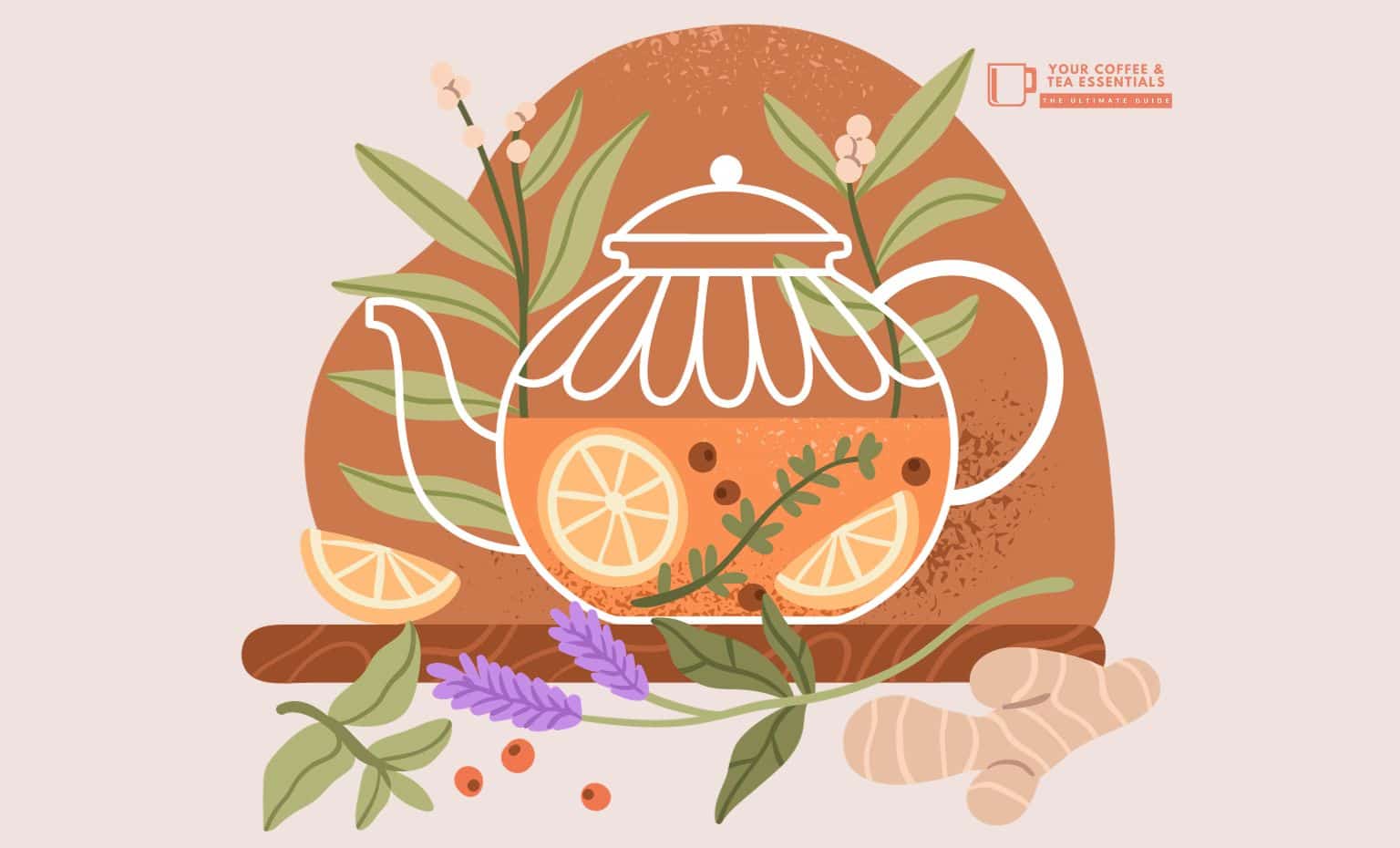
Are you a tea lover searching for a caffeine-free alternative to your favorite cuppa? Or perhaps you’re simply curious about the world of herbal teas and their potential health benefits.
Either way, you’re in the right place! 🙂
In this blog post, we’ll dive deep into the world of caffeine-free herbal teas, exploring their origins, flavors, and benefits, so you can make an informed decision when it comes to your next tea-time treat.
Importantly, one question you might have is, “Does herbal tea have caffeine?”
From the energizing properties of peppermint tea to the soothing effects of chamomile lavender tea, there’s a caffeine-free herbal tea out there for everyone. We’ll also touch on the differences between decaffeinated and caffeine-free teas, so you can make the best choice for your needs.
So, grab your teacup, and let’s embark on an herbal tea adventure!
Understanding Herbal Teas and Caffeine
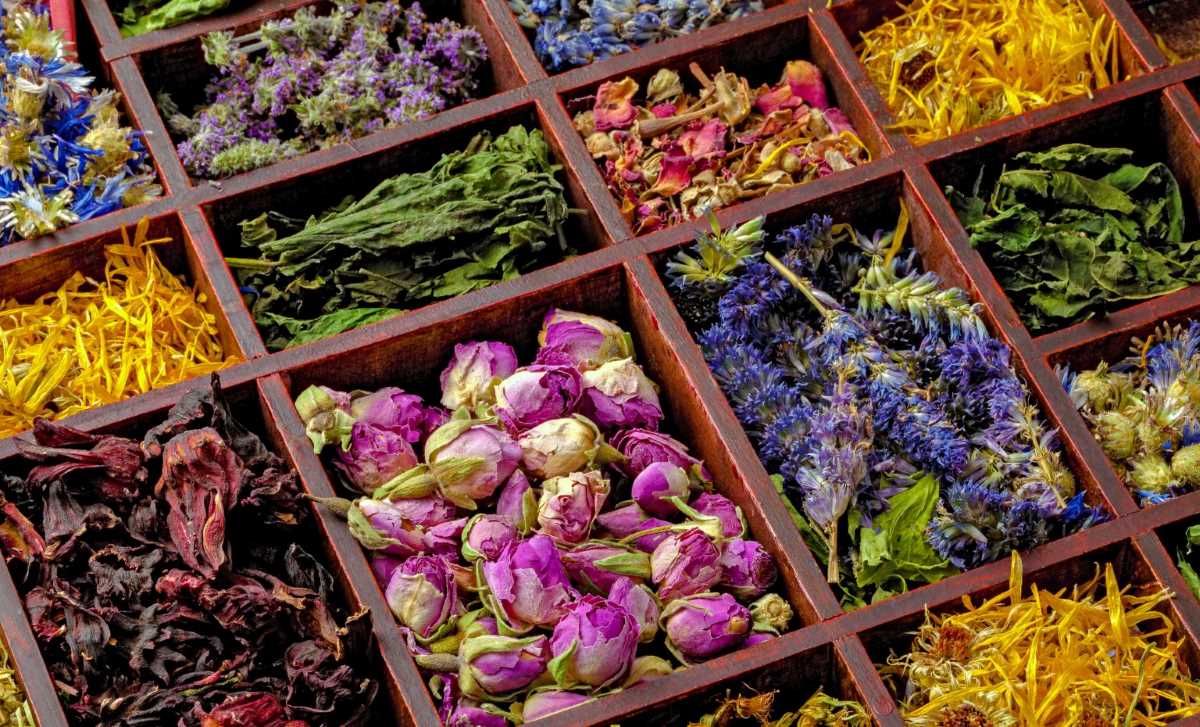
Herbal teas hold a special place in the world of beverages, offering a unique experience distinct from traditional teas derived from the Camellia sinensis plant.
Most herbal teas are naturally caffeine-free. There are possibly hundreds of different herbs that you can make tea from, each boasting its own set of flavors and health benefits. Some of the benefits of herbal teas include:
- Natural detoxification
- Immune system support
- Digestive aid
- Stress relief
- Anti-inflammatory properties
These caffeine-free wonders have something for everyone.
Although most herbal teas are caffeine-free, this does not mean all herbs are caffeine-free! For example, Yerba Mate is an entirely different plant from Camellia sinensis. Yerba mate tea is a high-caffeine tea and can contain up to 80 mg of caffeine per cup (1), which is similar to a cup of coffee.
Also, some blends may contain small amounts of caffeine from other plants including true teas (Camellia sinensis). Being aware of these potential sources is key when selecting an herbal tea.
Now, let’s delve deeper into the fascinating world of herbal teas, and explore their relationship with caffeine and the unique properties each has to offer.
What are Herbal Teas?
Herbal teas, unlike true teas (such as white, green, black, and oolong tea), are brewed from a variety of plants other than the Camellia sinensis plant. These can include:
- Herbs
- Flowers
- Seeds
- Spices
- Roots
- Fruits
Herbal teas can be enjoyed as hot tea or iced tea.
So, if you’re looking for a caffeine-free alternative to your regular cuppa, herbal teas offer a world of flavors and experiences waiting to be discovered. Some popular caffeine-free options include:
- Chamomile tea
- Lavender tea
- Rooibos tea
- Peppermint tea
- Licorice tea
With such a wide variety of plants used in herbal teas, the possibilities are nearly endless!
Note that decaf teas are not herbal teas. These are true teas that have undergone a process to remove most of the caffeine. In contrast, caffeine-free teas contain no caffeine.
Common Caffeine-Containing Plants
Though most herbal teas are caffeine-free, there are some exceptions to this rule. Certain plants naturally contain caffeine and can be found in some herbal tea blends. For example:
- Yerba Mate: about 80 mg of caffeine per cup (1).
- Coffee: about 90 mg of caffeine per cup but highly depends on preparation and the coffee bean variety.
- Cocoa beans and chocolate: About 5 mg of caffeine per cup of hot chocolate (2) but can be as high as 15 mg of caffeine per cup at Starbucks (3).
- Guarana: Guarana seeds contain about 3.6 to 5.8 percent caffeine by weight (4), which is a high conversation. Guarana extract products can have up to 200 mg of caffeine per tablet (5).
- Guayusa: Contains about the same amount of caffeine as a cup of coffee
These are all natural sources of caffeine.
Recognizing these caffeine-containing plants is crucial in selecting an herbal tea, particularly if your goal is to reduce or eliminate caffeine from your diet. A careful review of the ingredients list on your tea package will help ensure that your chosen blend matches your caffeine preferences.
Decaffeinated vs. Caffeine-Free Tea
Decaffeinated and caffeine-free teas are often confused, but there’s a key difference between the two.
Decaffeinated teas have undergone a process to remove most of the caffeine, while caffeine-free teas are naturally devoid of caffeine.
Considering this distinction is crucial when selecting a tea that aligns with your needs and preferences.
For those who enjoy the flavors and benefits of traditional teas but wish to reduce their caffeine intake, decaffeinated teas might be the perfect option. However, if you’re looking for a completely caffeine-free beverage, herbal teas offer a wide range of flavors and health benefits, making them an excellent choice.
How is Tea Decaffeinated?
Tea can be decaffeinated through a variety of methods, including the use of water, carbon dioxide, organic solvents like ethyl acetate, absorbents, and even by using microorganisms (6). These processes are designed to remove the majority of caffeine from the tea leaves while preserving the flavor and quality of the tea as much as possible.
The image below is a simple diagram showing tea decaffeination using carbon dioxide. First, the tea leaves are soaked in water, then hot pressurized CO2 is passed through the leaves. This causes the caffeine molecules to bond with the carbon dioxide molecules. The caffeine-laden CO2 molecules are then filtered. The result is tea leaves with most of the caffeine removed.
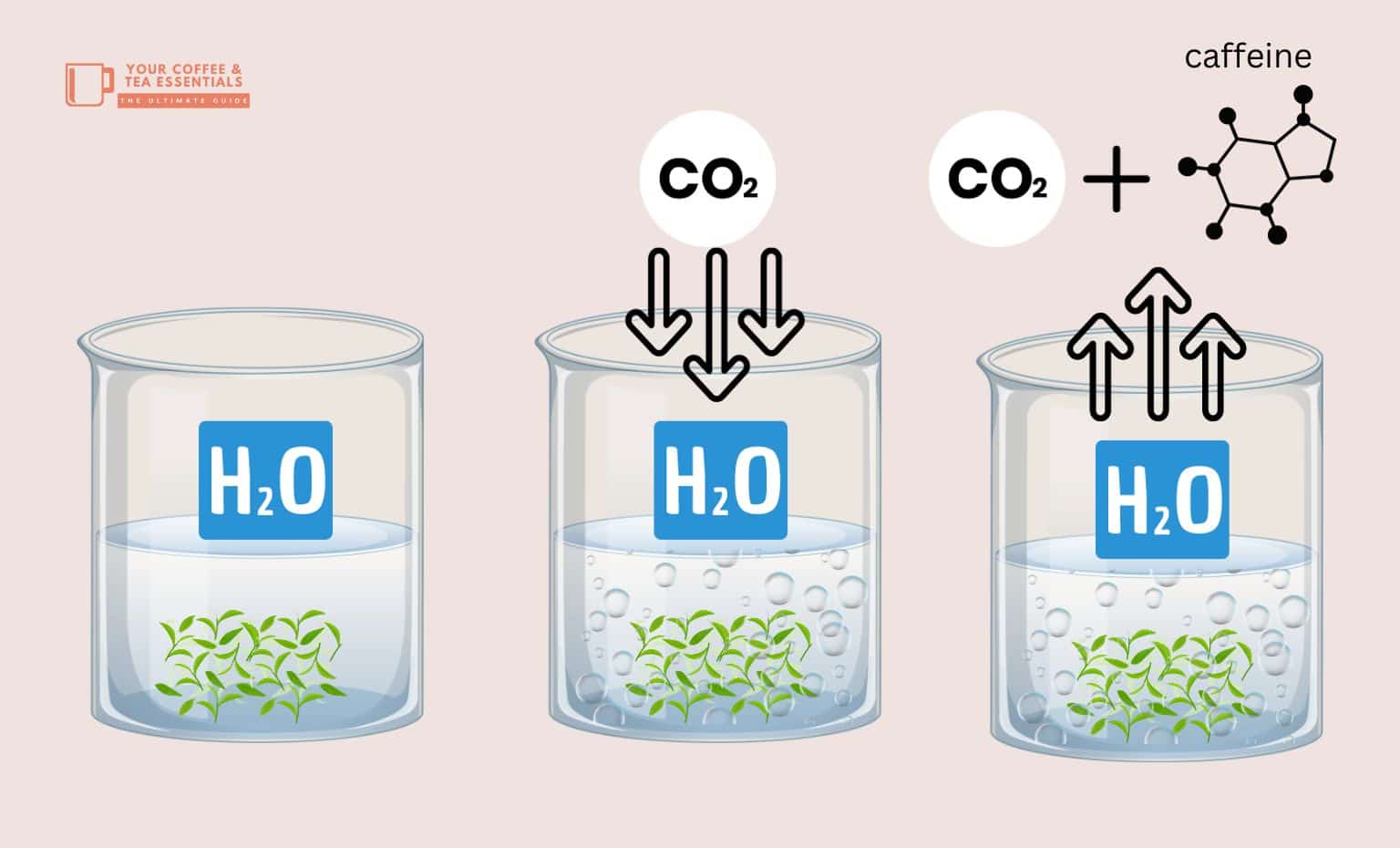
It’s worth noting that the decaffeination process may still have an impact on the tea’s flavor and quality. Hence, it’s crucial to thoughtfully consider your preferences and priorities when selecting between decaffeinated and caffeine-free teas.
Pros and Cons of Decaf and Caffeine-Free Teas
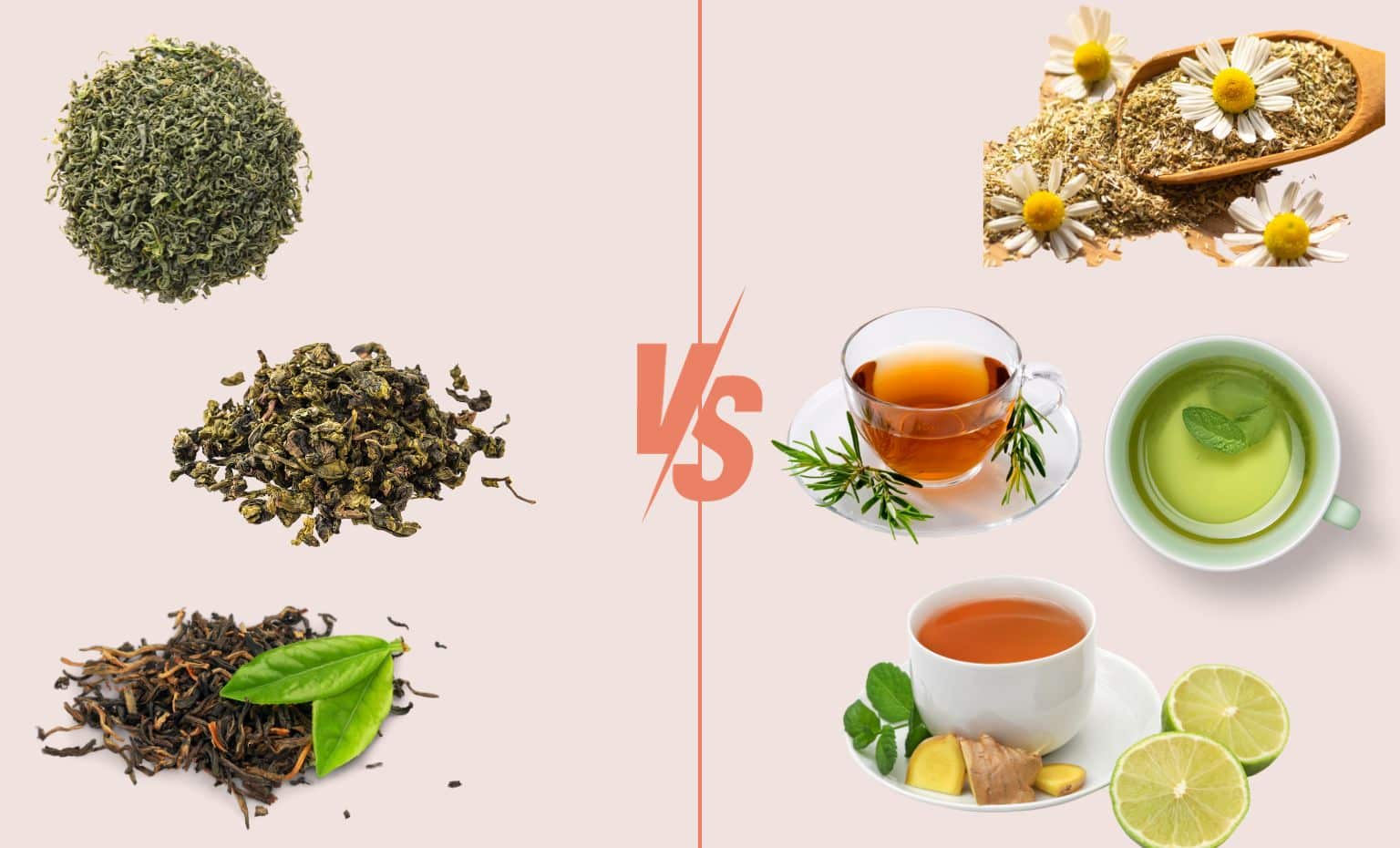
While both decaf and caffeine-free teas have their advantages, it’s important to weigh the pros and cons before making a decision.
- Decaf tea may still contain trace amounts of caffeine; a typical cup of decaffeinated tea contains about 4 mg of caffeine (7). However, they often retain some of the beneficial compounds present in traditional teas.
- On the other hand, caffeine-free teas offer a completely caffeine-free option with a variety of flavors and health benefits, such as natural detoxification and immune system support.
- The main drawback of decaf and caffeine-free teas is that they may not possess the same taste or beneficial properties as regular caffeinated teas. However, with the wide variety of herbal teas available, you’re sure to find a caffeine-free option that suits your taste buds and meets your health needs.
Related Reads:
- 8 Great Teas Whenever you Need a Tea For Headaches
- Wondering What is the Best Tea for a Cold? Here are 7!
Energizing Caffeine-Free Herbal Teas
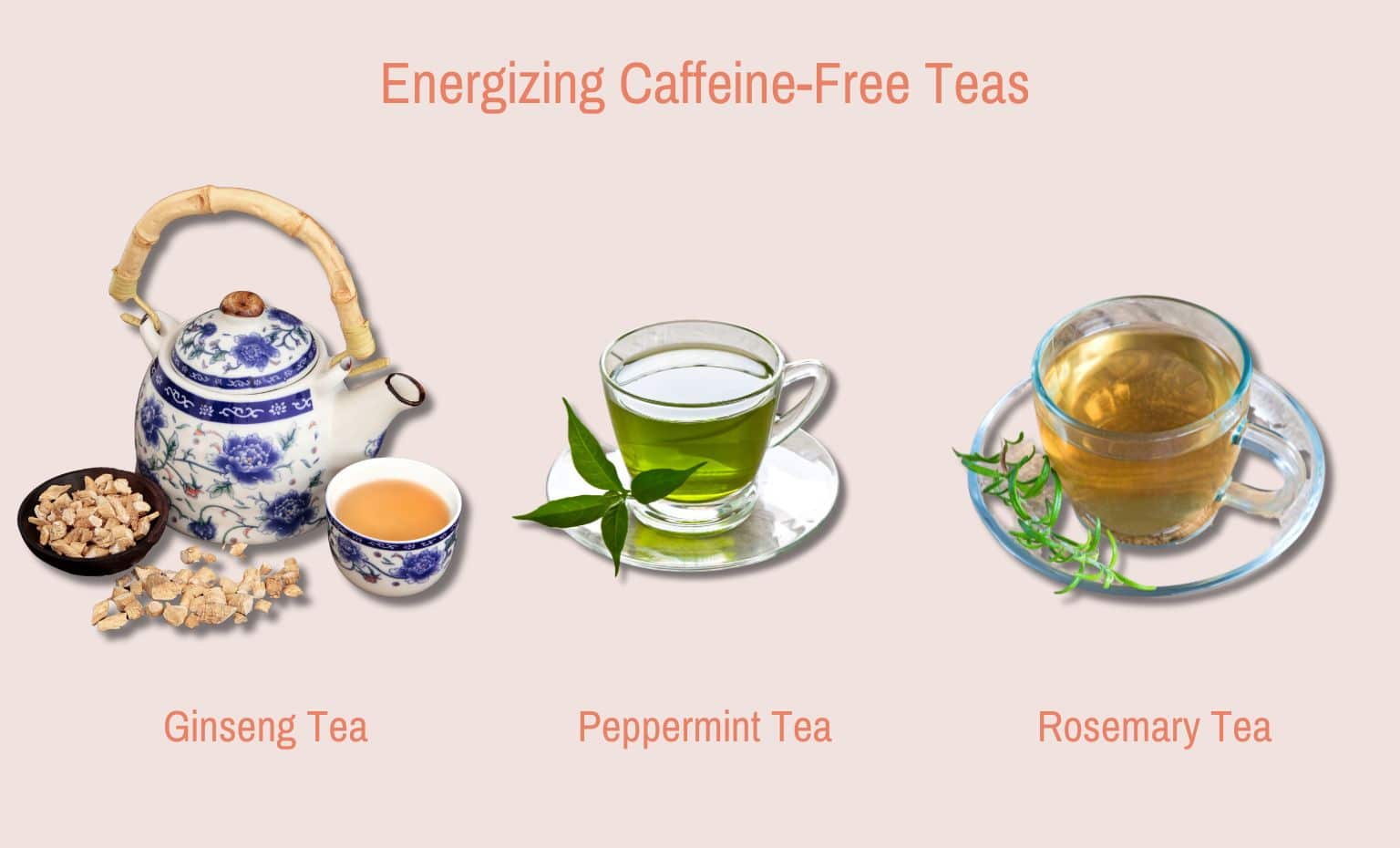
If you’re in search of a caffeine-free pick-me-up, look no further than energizing herbal teas. While they don’t contain caffeine, certain herbal teas can provide a natural boost of energy to help you power through your day.
In this section, we’ll explore three energizing caffeine-free herbal teas:
- Peppermint tea,
- Ginseng tea, and
- Rosemary tea.
These herbal teas offer unique flavors and properties, giving you the opportunity to find the perfect energizing tea for your needs.
Let’s dive into each of these energizing options and discover how they can help you stay alert and focused without relying on caffeine.
Peppermint Tea
Peppermint tea is a refreshing and invigorating caffeine-free option, thanks to the presence of menthol (8), an organic compound that provides a cooling and refreshing effect (9). Peppermint essential oils have been shown to improve concentration and reduce fatigue in a study involving rats (10), and it has been shown to improve performance in human male athletes, based on a 2013 study (11). This makes peppermint tea a great choice for those seeking a caffeine-free energy boost.
In addition to its energizing effects, peppermint tea also offers several health benefits. The essential oils may have antiviral and antimicrobial properties (12), which can help relieve tension headaches and migraines (13) and improve digestive issues such as irritable bowel syndrome (14).
It should be noted that most studies involve peppermint essential oils and not the tea itself. Further research is needed to determine the health benefits of drinking peppermint tea.
With its refreshing flavor and energy-boosting properties, peppermint tea is a fantastic caffeine-free alternative.
Ginseng Tea
Ginseng tea, another caffeine-free herbal tea, is renowned for its energy-boosting properties. Ginseng contains compounds such as ginsenosides, eleutherosides, and ciwujianosides which may boost energy and performance levels (15).
In short, ginseng tea may support cognitive function, improve physical performance, and enhance mood contributing to overall vitality and well-being. This makes ginseng tea an excellent choice for those seeking a natural energy boost without caffeine.
Rosemary Tea
Rosemary tea is another energizing caffeine-free option. This aromatic herb is known for its invigorating scent and flavor.
Inhaling rosemary oils may improve alertness based on a study involving 20 adults (16). Although more research is required to understand the impacts of the actual tea, there is some evidence the tea itself could help. A small study involving diluted rosemary in 250 mL of water increased the performance of computerized tasks on the 8 adults being studied (17).
This is not surprising since rosemary has been traditionally used to combat fatigue and enhance mood, making it a great choice for those seeking a natural, caffeine-free pick-me-up. So, if you're looking for a tea that can help you stay focused and energized throughout the day, consider brewing a cup of rosemary tea.
Calming and Soothing Herbal Teas
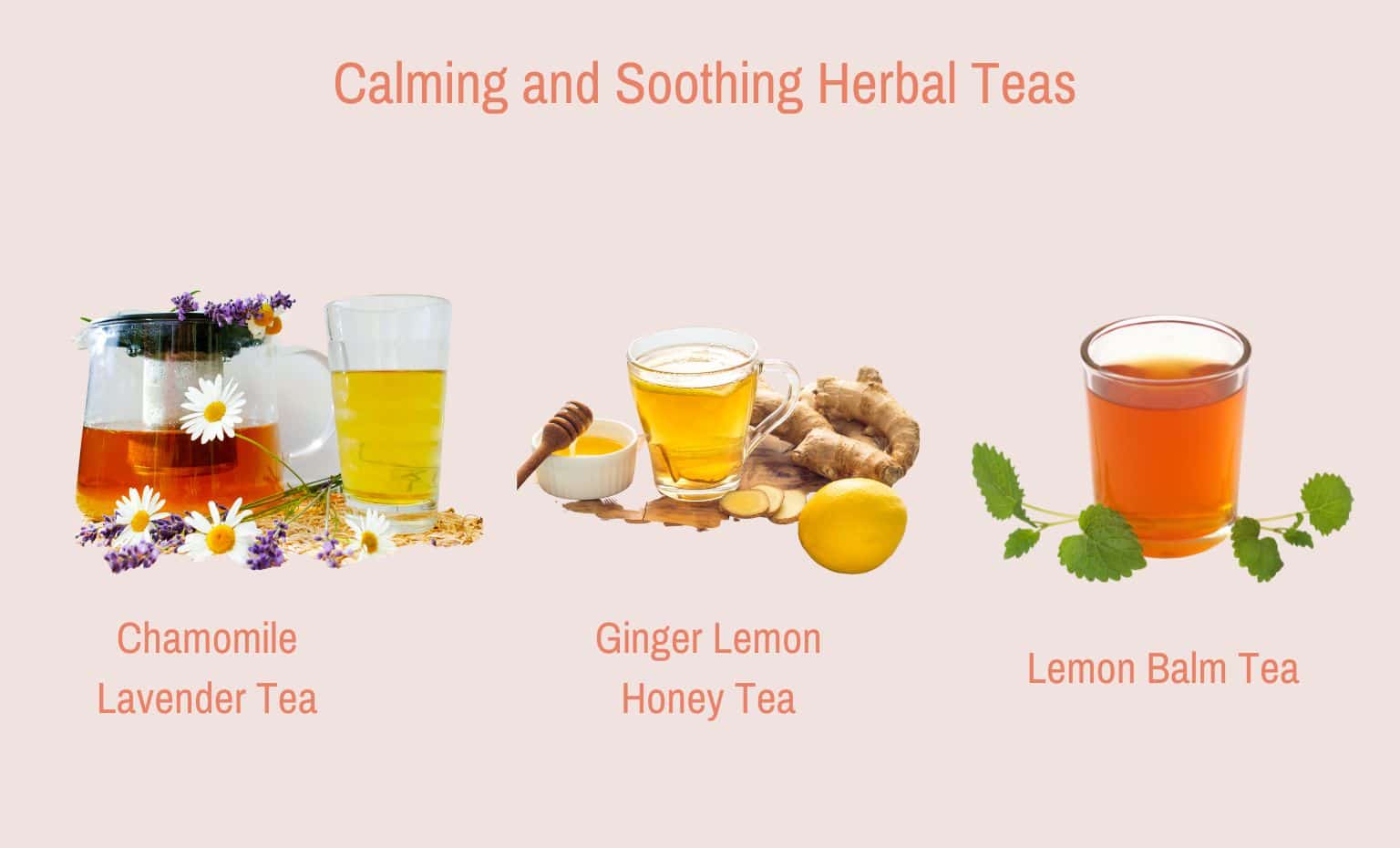
After a long day, there’s nothing quite like a calming and soothing herbal tea to help you unwind and relax. These caffeine-free teas offer a gentle, comforting experience, perfect for those looking to alleviate stress and anxiety or promote better sleep.
We’ll explore three calming and soothing caffeine-free herbal teas next: chamomile lavender tea, ginger lemon honey tea, and lemon balm tea. Each tea presents unique flavors and properties to help guide you towards tranquility and relaxation.
Now, let’s explore these calming options and understand their role in achieving serenity at the day’s end.
Chamomile Lavender Tea
Chamomile lavender tea is a soothing blend that effectively reduces anxiety and promotes better sleep. This calming tea combines the gentle properties of chamomile with the relaxing scent of lavender, creating a perfect harmony to help you unwind after a busy day.
Some of the benefits of chamomile lavender tea include:
- Relaxation
- Stress reduction
- Muscle soothing
- Improved sleep quality
- Alleviating tension and relaxing agitated nerves
This makes it an ideal choice for those seeking a calming and comforting caffeine-free beverage.
Ginger Lemon Honey Tea
Ginger lemon honey tea is another calming and comforting herbal tea option, combining the anti-inflammatory properties of ginger with vitamin C-rich lemon and soothing honey. This unique blend offers a tranquil experience, perfect for those looking to unwind and indulge in self-care.
The health benefits of ginger lemon honey tea include:
- Boosting immunity
- Promoting respiratory health
- Alleviating nausea
- Supporting brain functioning
By enjoying a cup of ginger lemon honey tea, you’re not only promoting relaxation but also nurturing your overall well-being.
Lemon Balm Tea
Lemon balm tea is a caffeine-free herbal tea known for its relaxation properties. This soothing tea contains rosmarinic acid, an antioxidant and anti-stress compound that has been found to be effective in reducing anxiety and improving mood.
In addition to its calming effects, lemon balm tea has also been suggested to aid in:
- Improving sleep
- Reducing anxiety
- Boosting cognitive function
- Easing insomnia
- Improving mood
With its delightful flavor and soothing properties, lemon balm tea is a perfect choice for those seeking a moment of calm and tranquility.
Tips for Choosing and Brewing Herbal Teas
With so many herbal teas available, selecting the perfect blend and brewing it correctly can seem like a daunting task. However, by keeping a few key tips in mind, you can ensure that you’re choosing high-quality herbal teas and extracting the best flavors and health benefits from them.
From reading ingredient lists to using proper brewing techniques, being mindful of these factors can greatly enhance your herbal tea experience. Next, we’ll share some practical tips for selecting and brewing the perfect cup of herbal tea.
Reading Ingredients Lists
To ensure your herbal tea is caffeine-free, it’s important to check the ingredients list for any caffeine-containing plants or blends. Some plants to look out for include:
- Coffee
- Guarana
- Yerba mate
- Cocoa or chocolate
- Kola nut
These plants all naturally contain caffeine.
A careful examination of your tea package’s ingredients list will ensure your chosen blend is caffeine-free and in line with your preferences and dietary needs.
Brewing Techniques
While brewing techniques for herbal teas can vary, they usually involve steeping the tea in hot water for a set amount of time to extract the desired flavors and health benefits. For optimal brewing, it’s recommended to use boiling water and steep your tea for 5-10 minutes, depending on the specific tea variety.
If you have a teapot or a tea infuser, we always recommend using loose-leaf teas over teabags. Loose-leaf tea tends to be of higher quality.
Additionally, using 1 teaspoon of loose-leaf tea per 8oz of water is suggested to achieve the perfect balance of flavor and potency. By following these guidelines and adhering to the recommended steeping time and temperature, you can enjoy the full benefits and delightful flavors of your chosen herbal tea.
Related Reads:
- Does Matcha Have Caffeine?
- Is Tea Acidic? A Comprehensive Guide on Tea Acidity
- The Best Green Teas for Weight Loss
Frequently Asked Questions
Do any herbal teas have caffeine?
Yes, some herbal teas do contain caffeine, such as yerba mate, guarana, and guayusa. These herbs are naturally high in caffeine, but manufacturers may also add them to herbal tea blends to increase the caffeine content. Also, avoid herbal blends that contain chocolate products!
Which herbal tea has the most caffeine?
Yerba mate tea has amongst the highest caffeine levels of herbal teas (i.e. not from the Camellia sinensis plant). The caffeine content of yerba mate approaches that of coffee, at 80 mg per cup (1).
What is the difference between herbal teas and true teas?
Herbal teas are brewed from plants other than Camellia sinensis. Most herbal teas are naturally caffeine-free, while true teas are derived from this plant and contain caffeine.
What are some popular caffeine-free herbal teas?
Popular caffeine-free herbal teas include jasmine, chamomile, lavender, rooibos, peppermint, and licorice.
Bottom Line
In conclusion, caffeine-free herbal teas offer a world of flavors and health benefits for those seeking an alternative to traditional caffeinated beverages. From energizing peppermint and rosemary teas to calming chamomile lavender and lemon balm teas, there’s a caffeine-free option for everyone.
We hope this in-depth guide has provided you with valuable insights into the world of caffeine-free herbal teas, helping you make informed choices and enjoy the full benefits of these delightful beverages.
So, go ahead and explore the vast world of herbal teas, and find your perfect caffeine-free blend to cherish and savor.
This article is intended for informational purposes only. It is not meant to replace professional medical advice, treatment or diagnosis. Do not consume any type of coffee, tea or herbal infusion if you are allergic to it. The information in this article is not intended to treat serious medical conditions. Please seek professional medical advice before using home remedies.
- Yerba Mate—A Long but Current History - PMC
- Milk, chocolate beverage, hot cocoa, homemade
- https://www.starbucks.com/menu/product/471/hot/nutrition
- Guarana (webmd.com)
- Caffeine in Guarana (caffeineinformer.com)
- (PDF) Caffeine in Green Tea: Its Removal and Isolation (researchgate.net)
- Caffeine in Tea (Decaf) (caffeineinformer.com)
- Comparative Chemical Analysis of Mentha piperita and M. spicata and a Fast Assessment of Commercial Peppermint Teas (sagepub.com)
- The distinctive role of menthol in pain and analgesia: Mechanisms, practices, and advances - PMC (nih.gov)
- Volatile Terpenes and Brain Function: Investigation of the Cognitive and Mood Effects of Mentha × Piperita L. Essential Oil with In Vitro Properties Relevant to Central Nervous System Function
- The effects of peppermint on exercise performance
- Essential oils, their therapeutic properties, and implication in dentistry: A review - PMC (nih.gov)
- Cutaneous application of menthol 10% solution as an abortive treatment of migraine without aura: a randomised, double-blind, placebo-controlled, crossed-over study
- Peppermint oil for the treatment of irritable bowel syndrome: a systematic review and meta-analysis
- Herbal medicine for sports: a review - PMC (nih.gov)
- Effects of inhaled rosemary oil on subjective feelings and activities of the nervous system - PubMed (nih.gov)
- Acute ingestion of rosemary water: Evidence of cognitive and cerebrovascular effects in healthy adults - PubMed (nih.gov)